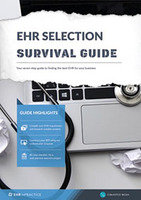5 questions to ask your clinicians during EHR replacement
When replacing an existing EHR system, there may be a great degree of anxiety around the challenge of ensuring the new system is better than the legacy system. Clinical staff are most directly impacted by the EHR replacement, as their patient visits are captured and billed through the system. When selecting a new EHR system, you can obtain valuable information about practice requirements by asking your clinicians for feedback and input.
1. What issues do you regularly experience with the existing EHR?
This may be the easiest question for your clinicians to answer. Most clinicians will be able to easily identify what is wrong with the EHR system that is currently in use. By identifying the components of an EHR system that are not working well, you can look for a system that improves on these components or offers better alternative processes. An example of a complaint may be that it is difficult to transfer prescriptions to an outside pharmacy or that inputting objective data is laborious.
2. What do you need to make your job more efficient?
This question serves to identify functional areas where clinicians believe there is potential for improvement. This can identify EHR vendor services or features of a new EHR system that can increase productivity, efficiency and clinician satisfaction. An answer you may receive might be remote access for charting off-site or patient education portals to streamline patient education handouts.
Recommended reading: EHR selection survival guide - 7 steps to selection success
3. What components of the existing EHR do you find most useful?
This question serves to identify what the clinicians value in their current EHR processes. This will allow you to ensure the replacement EHR system offers these services. Clinicians will be upset if their favorite feature in an EHR system is no longer available in the replacement system.
4. How do you use EHR for communication with patients?
An area of patient care that can negatively impact clinician productivity and take up a lot of time in a workday is returning patient phone calls or messages. Many clinicians find value in utilizing EHR systems for patient communication, as it can be done quickly via messaging portals or secure emails. By identifying how the clinicians communicate with patients, you will be able to ensure continued success with communication with the new system.
5. What would an ideal EHR system provide?
This question serves to identify the “wish list” components of an EHR system. It may reveal components that may be unrealistic or too costly, but give an indication of the features that would ensure high user buy-in and clinician satisfaction.
Free white paper

EHR Selection Survival Guide
The comprehensive guide to selecting the best EHR system for your medical practice.

Featured white papers
Related articles
-

Five things your physicians hate about your legacy EHR
These legacy EHR issues suggest it might be time to upgrade your system
-

How to build the most accurate EHR budget plan possible
How to build an accurate Electronic Health Records budget plan
-

Calculating the useful life of your EHR - is it possible?
Factors that will impact your EHR's useful life and how to estimate their effect on your system's...




